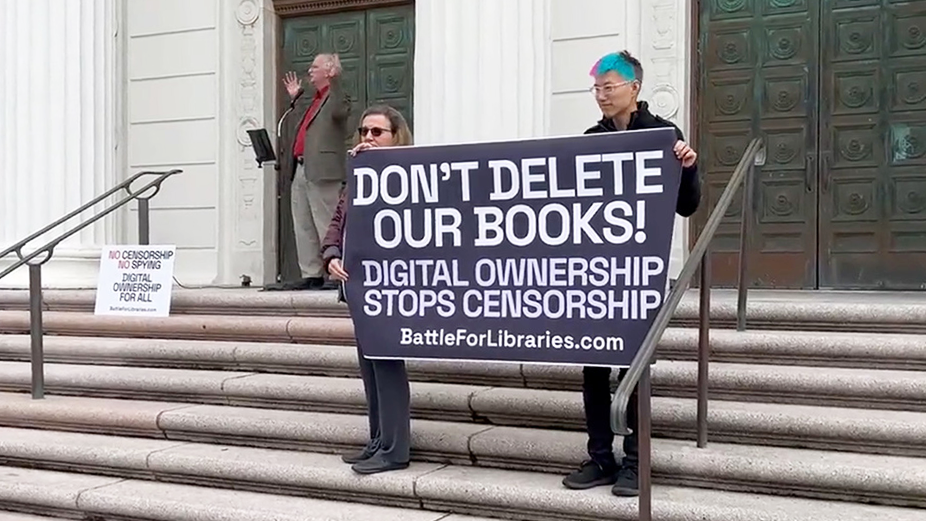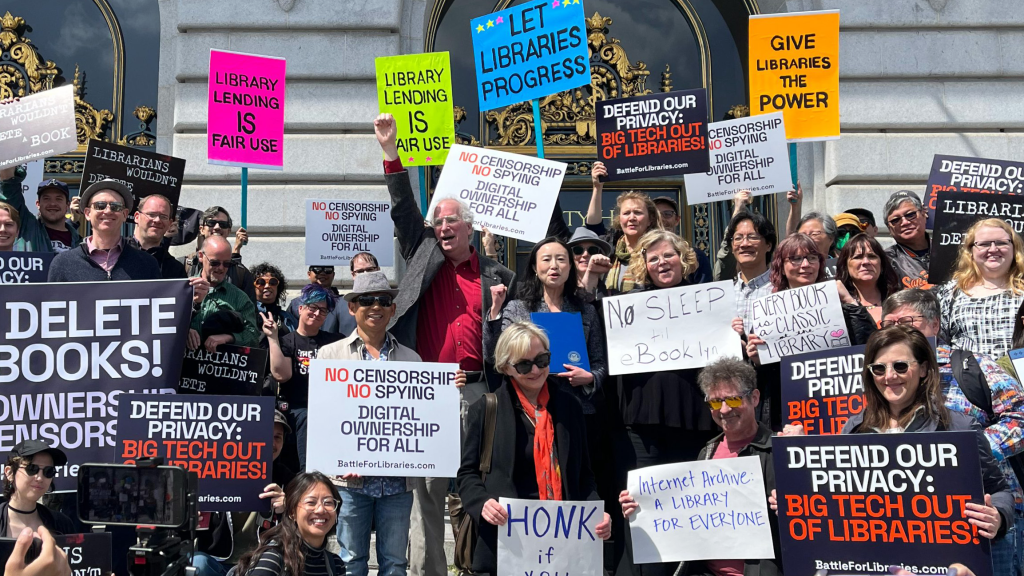Amid a wave of threats against libraries, the American Library Association and others fear the suit challenges freedom of information.
Last March, the Internet Archive was forced to curtail its lending of e-books following a judgment against the digital library in a lawsuit coordinated by the Association of American Publishers (AAP). In a celebratory press release, AAP president Maria A. Pallante attempted to draw a contrast between the Internet Archive and “the thousands of public libraries across the country that serve their communities every day,” whom Pallante thanked. But, in December, more than 100,000 of those libraries, as represented by the American Library Association (ALA) and Association of Research Libraries (ARL), expressed support for the Internet Archive’s appeal against the case.
“This is a fight to keep library books available for those seeking truth in the digital age,” says Brewster Kahle, founder of the Internet Archive. And other libraries appear to agree.
A court brief filed by the ALA and ARL urges the Second Circuit Court of Appeals to reconsider the lower court’s judgment in light of the impact that it will have, not just on the Internet Archive, but libraries across the United States. The appeal comes amid a wave of threats that libraries nationwide are trying to stem.
Hachette v. Internet Archive
“This lawsuit is an attack on a well-established practice used by hundreds of libraries—even traditional ones—to provide public access to their collections,” says Kahle.
The lawsuit coordinated by AAP against the Internet Archive involved some of the largest publishing companies in the world: Hachette, the lead plaintiff, as well as Penguin Random House, HarperCollins, and Wiley. Filed in 2020, the suit alleged that the Internet Archive committed copyright infringement by scanning and distributing copies of the publishers’ books online via its National Emergency Library.
In response to the start of the COVID-19 pandemic, the Internet Archive launched the National Emergency Library at a time when many libraries were closed and readers home under mandatory lockdowns. The Internet Archive facilitated the National Emergency Library by scanning purchased or donated books, encrypting the files produced to prevent them from being copied, and loaning them to one reader at a time for a limited amount of time using digital rights management tools. The Internet Archive argued that this was protected by “fair use,” which permits the use of copyrighted material without permission in cases that are non-commercial, limited and/or negligible to the market for the copyrighted material.
Judge John G. Koeltl disagreed. In Koeltl’s judgment, the Internet Archive—a nonprofit organization that charges readers no subscription—stood to profit from the National Emergency Library via donations; its lending was not limited; and it threatened the e-book market. Consequently, in August of 2023, the Internet Archive was forced to take down their digitized versions of the titles that publishers sold as e-books.
Internet Archive v. Hachette
The Internet Archive is now appealing Koeltl’s judgment. In its first court brief in the ongoing case (still known as Hachette v. Internet Archive), the Internet Archive argues that Koeltl fundamentally misunderstood the facts of the case, especially regarding fair use. The Internet Archive argues that, just as fair use protects the non-commercial, limited, and market-negligible lending of traditional libraries, it protects such lending by digital libraries too. More worrisome, the inverse may become true: If fair use can be denied to digital libraries, then it may be denied to traditional ones too.
This is where the American Library Association and Association of Research Libraries come in.
“This legal case … is part of a long-standing disagreement between libraries and publishers about how copyright principles should apply to libraries in the digital age,” says Jonathan Band, attorney for both the ALA and ARL.
In their aforementioned brief in support of the appeal, the libraries clarify that they are not filing in support of either the publishers or the Internet Archive, but in defense of fair use. Their concerns center on Koeltl’s judgment that donations entail profit and that digitization is not protected by fair use. If maintained, this judgment would render all libraries commercial enterprises and prevent them from continuing important work, such as digital archiving.
“ALA and ARL’s brief asks the court to preserve the fair use rights of libraries by correcting the District Court’s error in characterizing the Internet Archive’s use as commercial under the first factor of fair use,” says Katherine Klosek, director of information policy at the ARL. “If the publishers prevail on the ultimate question of fairness, we ask that the court craft its opinion in a way that is narrowly tailored to the facts in the case in order to preserve library fair use in other library contexts.”
Whether the Internet Archive and supporters of its appeal will prevail is yet to be determined. Publishers will be filing their opposing briefs later this month, and the court will be setting hearing dates thereafter.

“There is simply no legal support for the notion that Internet Archive or a library may convert millions of eBooks from print books for public distribution without the consent of, or compensation to, the authors and publishers,” says Terrence Hart, general counsel for Association of American Publishers. “The plaintiff publishers will vigorously litigate the appeal of this case, which stands for foundational copyright principles.”
Book Bans, et. al v. Libraries
As previously mentioned, Hachette v. Internet Archive arrives amid a wave of threats to libraries. Last March, three days after the AAP issued its celebratory press release regarding Koeltl’s judgment, the ALA issued its own statement condemning “the violence, threats of violence and other acts of intimidation that are increasingly taking place in America’s libraries.”
By its count, the Internet Archive estimates before Koeltl’s judgment, it was lending more than 500 banned books, which it has since been forced to take out of circulation. If successful, the ongoing appeal can help stem the tide and save libraries big and small, traditional and online.
“Libraries are under attack like never before,” says Kahle. “The core values and library functions of preservation and access, equal opportunity, and universal education are being threatened by book bans, budget cuts, onerous licensing schemes, and now by this harmful lawsuit. We are counting on the appellate judges to support libraries and our longstanding and widespread library practices in the digital age. Now is the time to stand up for libraries.”









